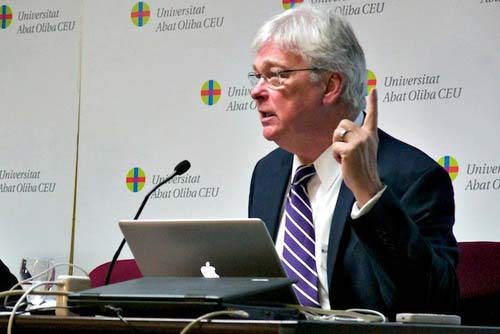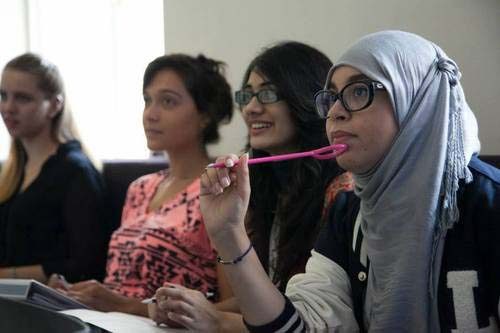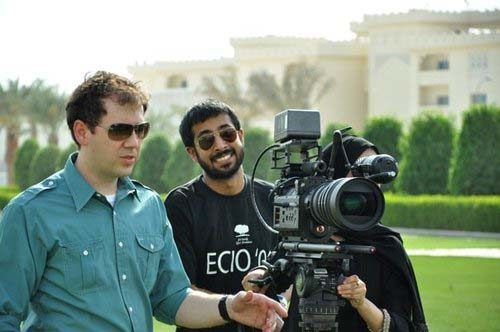
Over the summer, Doha-based Canadian journalist Mark Anderson sat down with Richard Roth, senior associate dean at Northwestern University in Qatar, to discuss press freedom here.
During the interview, Roth, who helped set up NU-Q to teach journalism and communications six years ago, explains the discouraging effect local media has had on journalism graduates, and how women will “take over the country” in the future. Below are some excerpts of the interview. Read the full piece here.
What is the hold-up on a modern press law in Qatar?
I don’t really know what the hold-up is; they’ve allegedly drafted one or more. I think they are afraid to go forward with real freedom; they don’t know what it’s going to buy them. This is not unusual…
It took the US a long time to get where it is today…
Qataris always use “culture” as a reason for (caution). It’s never clear to me what that means. This “culture” says, “We don’t run pictures of people without their consent.” Or, you don’t use their names—this is what the editors of papers have told me. I don’t know exactly what it is, but it’s certainly not a free press here.
There is so much that the public doesn’t know except by word of mouth and rumour. Local TV doesn’t cover it, local radio doesn’t cover it, and the local newspapers don’t cover important stories.
What role does the press have to play in an emerging Qatar?
The local press has very, very few if any locally written stories about the politics of Qatar. During the Arab Spring, the two principle local papers, the Gulf Times and the Peninsula devoted more space to the issues of the Arab Spring than the Guardian or the New York Times. But they have these huge news holes in these papers if you’ve looked at them; its page after page of world news. They fill them up.
They are paying those AP, AFP, and Reuters salaries…
That’s it. It all comes from syndicates and wire services. It’s not locally generated. They don’t really have reporters with the skills to do much of that anyway. What they get locally is from the Qatar News Agency, the government press agents.
What they send them by press release is what they run. The skills of the local journalists seem to be very low. Now it may be that they have skills they aren’t allowed to exercise, but I don’t think their skills are very high.
Jan Keulen (Director of the Doha Centre for Media Freedom) suggested this might be because journalism wasn’t traditionally seen as a respectable profession.
It certainly wasn’t. Five years ago, when Northwestern decided to come here, we thought about this and talked about it before we showed up here to teach journalism. At first, the students came to us and said, “I want to be a journalist,” but they didn’t really know what it meant to be a journalist.
What they see as journalism, is someone on Al Jazeera. They see Sherine Tadros on TV and say “I want to do what she does,” except I don’t want to be in the middle of Tahrir Square when the fighting is going on. They do not see themselves as a journalist at a local newspaper.
So far we haven’t had any students show any interest in going to a local newspaper after graduation. Several of our students are at Qatar TV, others are at Al Jazeera, but no one has shown any interest in working for these local papers.
What they see there are poorly paid south Asian men; there are very few women in the newsrooms. And almost all our students are women.
So they don’t see themselves in that environment. These are guys that are more stenographers than reporters—they simply take these press releases and put them in the format.
Government clerks…
Right. And if that is how the students see journalism, then they say “I’m not interested in journalism.” Most of our students, a few, 25 to 35 percent of them are actually doing journalism, but most of them are doing public relations kind of stuff.
Qatari females particularly tend to go work for the government. They work in the ministries because they are treated with respect—and they are paid a lot more than they would be in the private sector. And the work day ends at one.
So when they go to apply at Al Jazeera, they hear, “Ok we’ll hire you, you’re going to be on the overnight shift and you work every weekend, “The students say “What kind of a job is that if you have to work overnight?”
But that’s where they start the cub reporters, on that shift. So they don’t want to do it. And it’s understandable. If you get a choice of higher pay and working until one in the afternoon, or working overnight for half as much pay, you see where you are going to go.

The other day there was a story in the Peninsula where one of the editors was calling to raise the wages of reporters. Well he’s the editor— he can raise the wages. But what he’s saying is that he wants to have one standard for the Qataris, and another standard for the non-Qataris.
This notion of equal pay that Americans embrace doesn’t exist here; people here expect it to not exist. I had a student from Pakistan with a Pakistani passport; she knew going in that she would be paid a whole lot less than everyone else because she’s Pakistani, even though she was the best we had at print media.
She was going to get less—even though she was born and grew up in Qatar. That’s what they want to do here. What the editor really wants is to pay his salaries to reporters, say QR10,000 a month, ($2,750), and get the government to match it. They will get paid QR20,000 if they are Qatari, plus benefits that Qataris receive, such as pensions.
So they will be paid twice as much to do the same job. And once they are being paid by the government, they are never going to be watchdog reporters. It’s just not going to happen.
Northwestern is a highly respected university, recently ranked 19th in the world by The Times Higher Education World University Rankings . You are granting world-class journalism degrees in a constitutional monarchy. How is this possible and what are the challenges?
The challenge is maybe getting our students to practice what they preach. Academic freedom was guaranteed when we came here; we have not had one bit of resistance from anyone about what we are teaching. We were asked to teach the same curriculum as we teach in the US, including American-style English, which isn’t used anywhere around here.
So we are teaching the exact same curriculum. Each one of our students has an online subscription to the New York Times. We ask them to read it every day—we have news quizzes at the beginning of every class to make sure they are reading. They see what good journalism is—they hear us talk about it in the classrooms.

Then they look around. No wonder they don’t want to go work for these local newspapers; it’s not what they are being trained to do. What ought to happen is that some of these students should start going to these newspapers and take entry-level jobs.
In a year or two they should move up a bit, because they are actually educated in some of the things that need to be implemented. After 10 years, we might have a really good newspaper—if enough students go to work for them.
And perhaps become editors as well?
The non-Qataris can rise in the ranks but they will never be editor. However, one of our Qatari women could be editor.
I think women are going to take over this country because they are the ones that are being educated. The challenge is not a teaching one; it’s in the doing. Some of our students go to Al Jazeera. Some may leave Qatar and go to work somewhere else. I’m hoping they stay here and help change the media environment here.
It would be liberating for the country if people were simply better informed about what is going on. Sadly they aren’t well informed; there are things going on here that the general public simply doesn’t know about.
I want to talk a bit about Al Jazeera. How can a state-owned television station be a beacon of free speech when Qatar is not a democracy? Can you shed some light on this paradox?
It is largely true that Al Jazeera promotes free speech, but they seem to have similar restraints as the print media when it comes to talking about Qatar.
A year ago there was a fire at the Villaggio Mall where nineteen people, thirteen of them children, died. Al Jazeera was as bad as all the rest of them. All day long this fire is going on, people are being hauled out in body bags and nobody reports anything. There is the state-owned radio station QBS, which you can hear in many malls playing over the sound system.
I don’t know if it was playing at Villaggio that day but if they had come over the address system and said, “There is a fire and people are dying,” people could have heard that and could have possibly escaped. But it didn’t happen.
Al Jazeera and the others did nothing until the government issued a press release that night: “Here’s the story.” The government was out that day saying, “Don’t spread rumours; it’s against the law to spread rumours.”
What that meant is don’t do any independent reporting—wait for the official government report. But we had students out there standing at the mall with cameras—they could see what was going on. Doha News was publishing information online all day long.
Can you comment on the draft cybercrime law that was recently made public?
Yes, from what I know of this cybercrime law that’s been reported about a bit, it’s quite worrisome. From the language I’ve read in the newspapers, it looks like it’s worse than the PRISM system set up by the US (laughs). If they see online that you are saying something negative about someone…
As the draft law states, “Whether it’s true or not”…
Whether it’s true or not. Truth is not a defense apparently, if it reflects badly on the country or the currency. From what I’ve read it’s the same kind of murky language that you find in the 1979 press law. You can’t understand it. What do they mean by this? Is there going to be an effort to shut down these sites like Doha News, and some others that people use, mostly expats? Who knows? It’s even threatening everyday bloggers. I don’t know what I’ve said on my blog that would get me in trouble.
It seems like Qatar was waiting for a modern progressive press law and instead the government proposed a regressive cybercrime law: one that that counteracts the concept of the free press that was guaranteed in the new constitution.
It also doesn’t seem to have anything to do with cybercrime at all. I don’t want somebody busting into my bank account online, but that doesn’t seem to be the issue. I’m still trying to digest all of the spying going on all over the world trying to prevent terrorism. This doesn’t seem to be that kind of an issue either. I hope they don’t enact this draft of the law and that smarter people will prevail.
Did they leak parts of this draft law in order to gauge the reaction?
Could be. That’s my read on a lot of these things. They run it up the flagpole to see who reacts. And nothing happens until the Emir decrees it. He can have his people report to him and then he can say, “No I don’t accept that— let’s start over.”
Thoughts?
Credit: Top photo courtesy of Universitat Abat Oliba CEU; all other photos by NU-Q on Facebook







